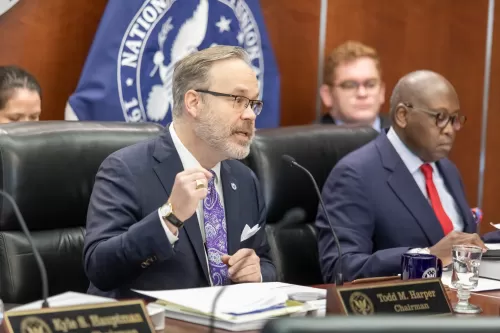NCUA Chairman Todd M. Harper at a meeting of the NCUA Board.
As Prepared for Delivery on June 22, 2023
Thank you, Pam, and Elizabeth, for your presentation and work on these important changes to the policy statement governing the NCUA’s minority depository institutions preservation program. June is Minority Depository Institutions Awareness Month at the NCUA, so I can think of no better time to bring this matter before the Board.
Congress created the credit union system to meet the credit and savings needs of credit union members, especially those of modest means. Providing under-resourced households with access to financial services is not only a statutory requirement, but it is also a moral imperative. An essential component to achieving that statutory mission is the work of minority depository institution credit unions, or MDI credit unions for short.
For millions of Americans, the work of MDI credit unions means under-resourced communities have access to safe, fair, and affordable financial products and services. That, in turn, leads to a chance to build a better and more secure financial future for themselves and their families. And, having a stable and vibrant financial system that serves the financial needs of all strengthens our nation and economy. As such, supporting and preserving MDI credit unions is a fundamental responsibility of the NCUA.
Today, we are proposing to amend Interpretive Ruling and Policy Statement 13-1 to reflect changes in the agency’s structure and administration of our MDI preservation efforts program by our Office of Credit Union Resources and Expansion. The revised policy statement would also improve to the preservation program by simplifying the definition of “community it services, as designated in its charter” to refer to an MDI credit union’s field of membership.
For several years, I have had concerns about the process used during an NCUA-assisted merger or liquidation of an MDI credit union. Under this revised policy statement, in the event of the potential failure of an MDI, the agency would contact MDI credit unions in the NCUA’s merger registry, which qualify to bid on a particular failing institution, to measure their interest. Agency staff would then offer technical assistance to any MDI credit union desiring to bid, in addition to providing MDI credit unions with an additional two weeks to submit a bid, whenever possible.
Together, these changes would not only bring the NCUA emergency merger process in line with that of the FDIC but also increase the likelihood of preserving the character of the merged-out MDI credit union. I have asked for the adoption of this modification in the agency’s merger policy for several years, and I am very pleased to see this change finally proposed today.
Today’s action isn’t the only effort the NCUA has undertaken to support MDIs. Last year, the agency launched the Small Credit Union and MDI Support Program. The most common areas of field assistance delivered to MDIs under this program were for examinations, staff training, and improving earnings in a rising interest-rate environment. In 2022, 136 MDI credit unions participated in these assistance efforts, and we’ve dedicated 5,500 hours to the regions to assist more MDI credit unions this year. And, the agency has recently changed the way it examines MDI credit unions to match more closely the practices of other federal banking regulators.
For years, the NCUA has compared MDI credit unions to non-MDI credit unions. This was an apples-to-oranges comparison. The unique business models of MDIs often allow for higher expenses and higher delinquencies compared to other federally insured institutions. Plus, the imbalance created by measuring MDIs with peer metrics intended for other credit unions could have a negative effect on MDI credit union operations and development.
So, to give MDI credit unions a more constructive basis for comparison, the NCUA this year began using new examination procedures that measure an MDI credit union’s performance against other MDI credit unions. These procedures are tailored to the unique business models of MDIs and represent an essential evolution of the examination process. What’s more, these changes will allow MDI credit unions to focus more time on serving their members.
The NCUA has also laid out a plan for its MDI preservation activities in the future. One step has already been completed: Congress added the MDI designation as an eligibility category for 2023 Community Development Revolving Loan Fund funding at the agency’s request. We will also host another MDI Symposium in the fall, continuing a practice begun by Board Member Hood.
There are other measures in the works, too, which is the focus of my only question. Pam, would you please describe the types of engagement the NCUA plans with stakeholders to support groups interested in applying for a new federal charter with an MDI designation and aiding existing credit unions interested in receiving the MDI designation?
Thank you for that response. I am pleased to see that the NCUA is taking a holistic approach to identifying and supporting new MDI designations and new MDI credit unions.
Promoting service, opportunity, and financial security for their members are fundamental to the work of MDI credit unions. Their existence means an entrepreneur — who other financial institutions might have overlooked — gets the loan needed to start a business and build wealth. It also means a young couple who lives in an under-resourced neighborhood can begin saving for a new home, a rainy day, or their child’s college education.
In closing, the proposed changes to our MDI preservation policy statement would enable hundreds of MDIs to continue meeting the needs of their members and communities. This, in turn, would help millions of Americans increase their financial security and opportunity. And, as I said earlier, expanding access to safe, fair, and affordable financial services through MDI credit unions is good for our economy and good for our democracy. I strongly support this proposal.
That concludes my remarks. I now recognize Vice Chairman Hauptman.




